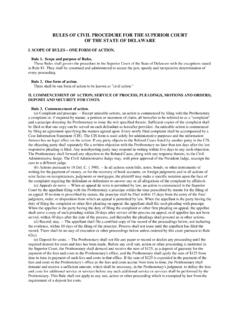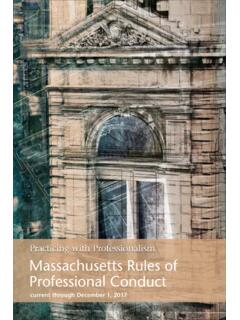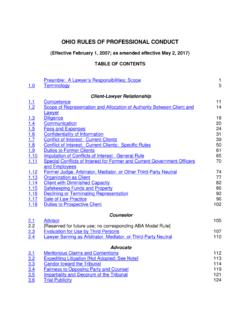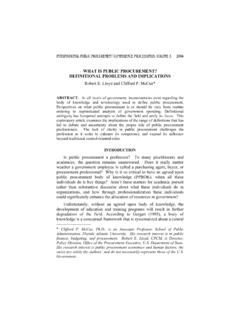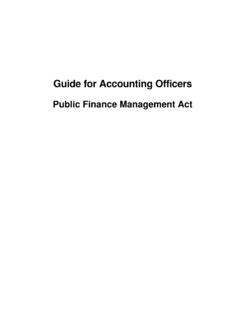Transcription of THE DELAWARE LAWYERS’ RULES OF PROFESSIONAL …
1 THE DELAWARE LAWYERS RULES OF PROFESSIONALCONDUCT[Effective July 1, 2003 and current through most recent amendment effectiveMar. 1, 2013]Preamble: A lawyer s Scope of Confidentiality of Conflict of interest: Current Conflict of interest: Current clients: Specific Duties to former Imputation of conflicts of interest: General Special conflicts of interest for former and current government officersand Former judge, arbitrator, mediator or other third-party Organization as Client with diminished Safekeeping Trust account overdraft Declining or terminating Sale of law Dissolution of law Duties to prospective [Deleted]. Evaluation for use by third Lawyer serving as third-party Meritorious claims and Expediting Candor toward the Fairness to opposing party and Impartiality and decorum of the Trial Lawyer as Special responsibilities of a Advocate in nonadjudicative [Deleted].
2 Truthfulness in statements to Communication with person represented by Dealing with unrepresented Respect for rights of third Responsibilities of partners, managers, and supervisory Responsibilities of a subordinate Responsibilities regarding non-lawyer PROFESSIONAL independence of a Unauthorized practice of law; multijurisdictional practice of Restrictions on right to Responsibilities regarding law-related Voluntary pro bono publico Accepting Membership in legal services Law reform activities affecting client Non-profit and court-annexed limited legal-service Communications concerning a lawyer s Solicitation of Communication of fields of practice and Firm names and Political contributions to obtain government legal engagements orappointments by Bar admission and disciplinary Judicial and legal Reporting PROFESSIONAL Disciplinary authority; choice of follows : A lawyer s responsibilities.
3 [1] A lawyer, as a member of the legal profession, is a representative ofclients, an officer of the legal system and a public citizen having specialresponsibility for the quality of justice.[2] As a representative of clients, a lawyer performs various functions. Asadvisor, a lawyer provides a client with an informed understanding of the604client s legal rights and obligations and explains their practical advocate, a lawyer zealously asserts the client s position under the RULES ofthe adversary system. As negotiator, a lawyer seeks a result advantageous tothe client but consistent with requirements of honest dealings with others. Asan evaluator, a lawyer acts by examining a client s legal affairs and reportingabout them to the client or to others.[3] In addition to these representational functions, a lawyer may serve as athird-party neutral, a nonrepresentational role helping the parties to resolve adispute or other matter.
4 Some of these RULES apply directly to lawyers who areor have served as third-party neutrals. See, , RULES and Inaddition, there are RULES that apply to lawyers who are not active in thepractice of law or to practicing lawyers even when they are acting in anonprofessional capacity. For example, a lawyer who commits fraud in theconduct of a business is subject to discipline for engaging in conduct involvingdishonesty, fraud, deceit or misrepresentation. See Rule [4] In all PROFESSIONAL functions a lawyer should be competent, prompt anddiligent. A lawyer should maintain communication with a client concerning therepresentation. A lawyer should keep in confidence information relating torepresentation of a client except so far as disclosure is required or permittedby the RULES of PROFESSIONAL Conduct or other law.[5] A lawyer s conduct should conform to the requirements of the law, bothin PROFESSIONAL service to clients and in the lawyer s business and personalaffairs.
5 A lawyer should use the law s procedures only for legitimate purposesand not to harass or intimidate others. A lawyer should demonstrate respect forthe legal system and for those who serve it, including judges, other lawyersand public officials. While it is a lawyer s duty, when necessary, to challengethe rectitude of official action, it is also a lawyer s duty to uphold legalprocess.[6] As a public citizen, a lawyer should seek improvement of the law,access to the legal system, the administration of justice and the quality ofservice rendered by the legal profession. As a member of a learned profession,a lawyer should cultivate knowledge of the law beyond its use for clients,employ that knowledge in reform of the law and work to strengthen legaleducation. In addition, a lawyer should further the public s understanding ofand confidence in the rule of law and the justice system because legal605institutions in a constitutional democracy depend on popular participation andsupport to maintain their authority.
6 A lawyer should be mindful of deficienciesin the administration of justice and of the fact that the poor, and sometimespersons who are not poor, cannot afford adequate legal assistance. Therefore,all lawyers should devote PROFESSIONAL time and resources and use civicinfluence to ensure equal access to our system of justice for all those whobecause of economic or social barriers cannot afford or secure adequate legalcounsel. A lawyer should aid the legal profession in pursuing these objectivesand should help the bar regulate itself in the public interest.[7] Many of a lawyer s PROFESSIONAL responsibilities are prescribed in theRules of PROFESSIONAL Conduct, as well as substantive and procedural , a lawyer is also guided by personal conscience and the approbationof PROFESSIONAL peers. A lawyer should strive to attain the highest level of skill,to improve the law and the legal profession and to exemplify the legalprofession s ideals of public service.
7 [8] A lawyer s responsibilities as a representative of clients, an officer ofthe legal system and a public citizen are usually harmonious. Thus, when anopposing party is well represented, a lawyer can be a zealous advocate onbehalf of a client and at the same time assume that justice is being done. Soalso, a lawyer can be sure that preserving client confidences ordinarily servesthe public interest because people are more likely to seek legal advice, andthereby heed their legal obligations, when they know their communicationswill be private.[9] In the nature of law practice, however, conflicting responsibilities areencountered. Virtually all difficult ethical problems arise from conflictbetween a lawyer s responsibilities to clients, to the legal system and to thelawyer s own interest in remaining an ethical person while earning asatisfactory living. The RULES of PROFESSIONAL conduct often prescribe terms forresolving such conflicts.
8 Within the framework of these RULES , however, manydifficult issues of PROFESSIONAL discretion can arise. Such issues must beresolved through the exercise of sensitive PROFESSIONAL and moral judgmentguided by the basic principles underlying the RULES . These principles includethe lawyer s obligation zealously to protect and pursue a client s legitimateinterests, within the bounds of the law, while maintaining a PROFESSIONAL ,courteous and civil attitude toward all persons involved in the legal [10] The legal profession is largely self-governing. Although otherprofessions also have been granted powers of self-government, the legalprofession is unique in this respect because of the close relationship betweenthe profession and the processes of government and law enforcement. Thisconnection is manifested in the fact that ultimate authority over the legalprofession is vested largely in the courts.
9 [11] To the extent that lawyers meet the obligations of their professionalcalling, the occasion for government regulation is obviated. Self-regulationalso helps maintain the legal profession s independence from governmentdomination. An independent legal profession is an important force inpreserving government under law, for abuse of legal authority is more readilychallenged by a profession whose members are not dependent on governmentfor the right to practice.[12] The legal profession s relative autonomy carries with it specialresponsibilities of self-government. The profession has a responsibility toassure that its regulations are conceived in the public interest and not infurtherance of parochial or self interested concerns of the bar. Every lawyer isresponsible for observance of the RULES of PROFESSIONAL Conduct. A lawyershould also aid in securing their observance by other lawyers.
10 Neglect of theseresponsibilities compromises the independence of the profession and thepublic interest which it serves.[13] Lawyers play a vital role in the preservation of society. The fulfillmentof this role requires an understanding by lawyers of their relationship to ourlegal system. The RULES of PROFESSIONAL Conduct, when properly applied,serve to define that [14] The RULES of PROFESSIONAL Conduct are RULES of reason. They should beinterpreted with reference to the purposes of legal representation and of thelaw itself. Some of the RULES are imperatives, cast in the terms shall or shall not. These define proper conduct for purposes of professionaldiscipline. Others, generally cast in the term may, are permissive and defineareas under the RULES in which the lawyer has discretion to exerciseprofessional judgment. No disciplinary action should be taken when the lawyerchooses not to act or acts within the bounds of such discretion.

